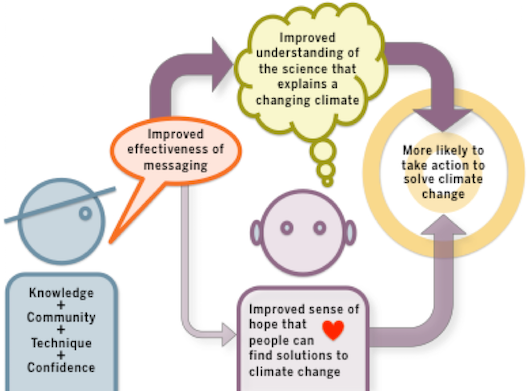I’m John Fraser, a conservation psychologist and President & CEO of the non-profit think tank, NewKnowledge.org. Our research on climate change has taken a very interesting direction in the past few years. For generations, we’ve focused on individual sustainability behaviors as a gateway to more conservation action. Unfortunately, that’s turning out not to be true. We’ve been working with the National Network for Ocean and Climate Change Interpretation, studying how people who visit informal learning environments engage in sustainability, and whether programs can increase their likelihood to do something.
Lesson Learned: There were two findings from our work that seemed counter-intuitive to the prevailing wisdom. First, the educators themselves exercised self-censoring and, like the majority of the population, thought their values were discordant to those in their community. It turned out that most people weren’t talking about the need to address climate change because they thought they were more concerned than others in their area. But surprisingly, almost everyone in our surveys estimated that their personal concern was greater than other organizations. And that perception led them to be less likely to engage others in talking about climate change solutions.
Our research has also corroborated a growing body of data suggesting that individual behaviors are more likely to help people feel self-assured and may not promote more global sustainability. If we truly believe that we need a more sustainable society, then one of the highest priorities in environmental action is promoting change in how organizations and groups choose to change their technologies away from carbon producing energy.
Therefore, this Hot Tip comes from our team. We’ve decided to stop using likelihood to engage in individual sphere behaviors as a representation of achieving sustainability outcomes. We suggest that unless we assess likelihood that individuals are working to engage others in their innovation, technology transfer, substitution and curtailment at a wholesale level, there is no way we’ll logically end up with the impacts that are the goal of most environmental education.

Image credit: NewKnowledge
The American Evaluation Association is celebrating Environmental Program Evaluation TIG Week with our colleagues in the Environmental Program Evaluation Topical Interest Group. The contributions all this week to aea365 come from our EPE TIG members. Do you have questions, concerns, kudos, or content to extend this aea365 contribution? Please add them in the comments section for this post on the aea365 webpage so that we may enrich our community of practice. Would you like to submit an aea365 Tip? Please send a note of interest to aea365@eval.org. aea365 is sponsored by the American Evaluation Association and provides a Tip-a-Day by and for evaluators.
